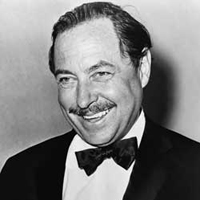The Timeless World of a Play by Tennessee Williams: Commentary
The Timeless World of a Play by Williams elaborates upon the generally accepted idea that art in any form captures and makes significant action, emotion, or mood 'in a world outside of time'. He pleads for greater understanding and for a recognition of the intensity of our own feelings.

Tennessee Williams (1911-1983)
He indicates his sensitivity to negative criticism about his work when he concludes by comparing the "world not ravaged by time," the performance of a play, with the nervousness of the dramatist who is waiting for the opening night's reviews and who learns at three in the morning about his disgrace.
First, the writer shows that the Greek audience accepted the artificial classical tragedies quite normal because of their tremendous nobility. Then he proves that the repose of sculpture and drama makes them great, and that they present truth partially. Following this, he explains that permanent art is created out of temporary life. People praise a play for this permanent quality, whereas they dread to talk about their temporary lives at parties.
Unlike the Greek audiences in the past, modern audience think that shown in the tragedies is untrue. While they watch the play in the theatre, they surrender themselves to the world of play. But as soon as they are out, they forget it. A modern writer has to bear this in mind while writing a play. If he ignores time factor, he will be bitterly criticised for it.
In this meditative essay, the writer is meditating. He is in a sense engaged in a conversation with himself. He is talking to himself, seeking to discover the truth about something. He is writing to describe his personal explorations. Because it is a means of exploration, the meditative essay is less concerned with persuading us about something than with revealing the author's process of thinking about something.
In the essay, the images and details have become symbols, and their meanings are suggestive. The author, in fact, repeatedly observes, and describes, and then thinks about things, allowing one image or thought to produce another through the mysterious generative powers of the mind. For this reason as we read this essay we find it like a poem.
As the product of personal experience, the criticism is highly impressive. Words, phrases and sentences move smoothly, rhythmically like a poem – 'The audience can sit back in a comforting desk to watch a world which is flooded with light and in which emotion and action have a dimension and dignity that they would likewise have in real existence………………………………..'. Poetic alliterative not can be realized in 'passion occurred in passing, ………….'. Ideas are themselves philosophical and poetic- 'Truth is fragmentary, at best we love and betray each other not in quite the same breath but in two breaths that occur in fairly close sequence. Very dramatically, he leaves us in ellipsis to consider the situation, when he says – ‘And this is the very truth that drama wishes to bring us…………'
Williams starts the essay with description of the classic tragedies of Greece and real attachment of the Greek to the unreal speech and events of the plays. The unreal conversation was real or very normal to them. This old trend becomes now ridiculous in the experience of modern audience. Williams also discusses different features and requirements as the foundation of great art. Tragic importance is still a possible thing if modern conditions meet. A play teaches us the basic truth of life that love and betray are both real and usual phenomena. Most often Williams demands intelligence to understand him- for example, in the remark of 'the great-big-little-transitory world', in the statement- 'By a sort of, legerdemain events are made to remain events, rather than being reduced so quickly to mere occurrences', also in the statement-'……………, there is no way to beat the game of being against non-being, in which non-being is the predestined victor on realistic levels.'
To sum up, the essay is very reliable, persuasive, a good referential source to students learning about drama and requirements for eternal effect of drama on audience.
Tennessee Williams Study Center
The Timeless World of a Play: Summary
Biography of Tennessee Williams
 |
bachelorandmaster.com |